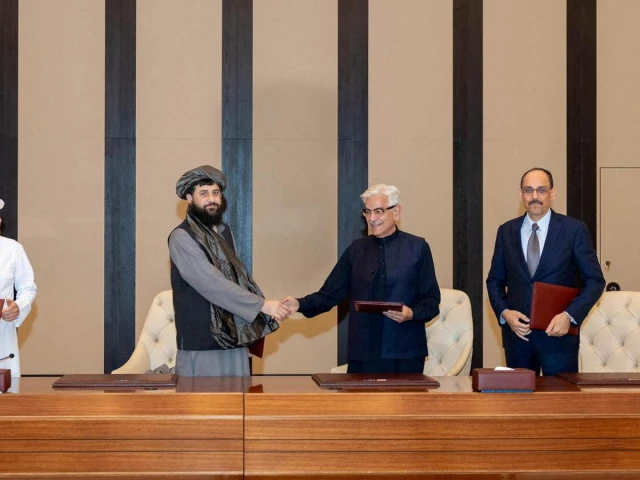Both sides agree to maintain the ceasefire on the condition that Afghan soil is not used for attacks against Pakistan.
Defense Minister Khawaja Muhammad Asif and Afghan Defense Minister Mullah Mohammad Yaqoob Mujahid shake hands after signing a ceasefire agreement brokered by Qatar and Turkey in Doha on October 19. Photo: Reuters
Pakistan and the Afghan Taliban have reached a provisional understanding after six days of high-level talks in Istanbul, aimed at preventing the use of Afghan soil for terrorist activities against Pakistan and taking decisive action against the Indian-backed militant groups, Tehreek-e-Taliban Pakistan (TTP) and the Balochistan Liberation Army (BLA), which Pakistani officials refer to as “Fitna al-Khawarij” and “Fitna al-Hindustan.”
The dialogue appeared to stall several times over the past week, with the Pakistani delegation even preparing to return home without making any progress. However, following requests from the host nations – Turkiye and Qatar – and a call from the Afghan Taliban delegation, Pakistan agreed to continue negotiations “to give peace another chance.”
During Thursday’s session, both sides reached a provisional mutual understanding, the key points of which are outlined below:
-
All parties reaffirmed that the aim of the talks was to reinforce the ceasefire originally agreed in Doha.
-
Both sides committed to maintaining the ceasefire on the condition that Afghan territory is not used for terrorist attacks against Pakistan. The understanding also requires the Afghan Taliban to take “clear, verifiable and effective measures” against groups such as Fitna al Khwarij (TTP) and Fitna al Hindustan (BLA).
-
The next round of talks will be held in Istanbul on November 6 to finalize details and implementation mechanisms.
-
A joint monitoring and verification mechanism will be established to ensure compliance and impose sanctions on any party violating the agreement.
-
Turkiye and Qatar, acting as mediators and hosts, praised both sides for their participation and reaffirmed their commitment to supporting lasting peace and stability in the region.
During the talks, the Pakistani delegation maintained a firm, evidence-based stance, presenting its demands with “clarity, professionalism and logical coherence.” The final agreement was described as a “victory of reason and the national interest.”
The provisional outcome of the talks is a positive step towards regional stability and a historic achievement despite adversaries’ attempts to derail the process through propaganda and pressure.
Pakistan’s participation in the Istanbul talks, marked by “seriousness, prudence and national dignity”, has been widely appreciated. He also credited mediation efforts by Turkiye and Qatar for helping achieve the breakthrough.
The government reiterated that Pakistan remains committed to the pursuit of peace but will not compromise its sovereignty, national interest or public safety. The civil and military leaders reaffirmed unity and determination to counter all internal and external threats to the country’s stability.
Doha talks
The Istanbul talks come after Pakistan and Afghanistan agreed on an immediate ceasefire during the Doha talks, following a week of intense border clashes, the worst since the Taliban took power in Kabul in 2021.
Pakistani delegation, headed by Khawaja Asif, including other senior officials. On the Afghan side, the talks were led by the acting Minister of Defense, Mullah Yaqoob, accompanied by other representatives.
Pakistani officials raised the issue of cross-border terrorist attacks originating from Afghanistan, singling out groups such as the Gul Bahadur faction and the TTP in particular. Islamabad maintains that these groups have been involved in multiple deadly incidents inside Pakistan in recent months.
Sources familiar with the talks said Pakistan put forward a “single-point agenda” focused on dismantling terror networks. “Pakistan has made it clear that the Afghan government must eliminate terrorist organizations and their hideouts,” the sources said.
Taliban spokesman Zabihullah Mujahid said in a statement that the parties agreed to a comprehensive and meaningful ceasefire.
Tensions rose after unprovoked shooting by the Afghan Taliban regime
Tensions along the Pakistan-Afghanistan border escalated on October 12, when clashes broke out after the Afghan Taliban regime opened unprovoked fire at multiple locations in Khyber-Pakhtunkhwa (KP) and Balochistan, prompting a swift and forceful response from the Pakistan Army, which destroyed several Afghan posts and killed dozens of Afghan soldiers and militants.
The coordinated attack originated from several key sectors including Angoor Adda, Bajaur, Kurram, Dir, Chitral in Khyber-Pakhtunkhwa and Baramcha in Balochistan. The firing, security sources said, was aimed at facilitating the illegal entry of Khwarij (the state-designated term for the banned TTP) into Pakistani territory.
“Pakistan army responded immediately and decisively,” security sources said. “The counteroffensive effectively attacked and destroyed multiple Afghan posts on the border. Dozens of Afghan and Khwarij soldiers were killed in retaliatory fire.”




